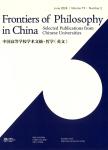Can the West Save the East? Intrinsic Value and the Foundation of Chinese Environmental Ethics
Can the West Save the East? Intrinsic Value and the Foundation of Chinese Environmental Ethics作者机构:Department of Philosophy and Religion Studies University of North Texas 310920 Denton USA
出 版 物:《Frontiers of Philosophy in China》 (中国哲学前沿(英文版))
年 卷 期:2012年第7卷第1期
页 面:112-127页
学科分类:01[哲学] 083001[工学-环境科学] 0830[工学-环境科学与工程(可授工学、理学、农学学位)] 0101[哲学-哲学] 08[工学] 010108[哲学-科学技术哲学]
基 金:Comisión Interministerial de Ciencia y Tecnología(98/1040 PB97/0505)
主 题:intrinsic value rationality feelings Qi creativity emptiness
摘 要:Intrinsic value in nature is a key concept in professional environmental ethics literature in the West. Western scholars such as Holmes Rolston III and Paul Taylor argue that the philosophical foundation of environmental ethics should be based on the concept of intrinsic value in nature. Influenced by this concept, some influential Chinese environmental ethics scholars such as Yu Mouchang and Lu Feng argue that the foundation of environmental ethics in China should be based on the concept of intrinsic value in nature. This paper holds that the metaphysical, epistemological and ethical meaning of intrinsic value in nature is the legacy of Western philosophical traditions, which is in conflict with the Chinese philosophical traditions. Meanwile, the paper argues that the Daoist conception of living in harmony with nature can become the foundation for Chinese environmental ethics. The Daoist conception of living in harmony with nature is based on aesthetic appreciation of nature and people's participation in the beauty of nature.



